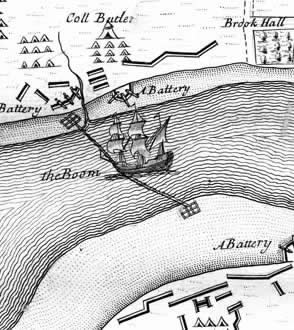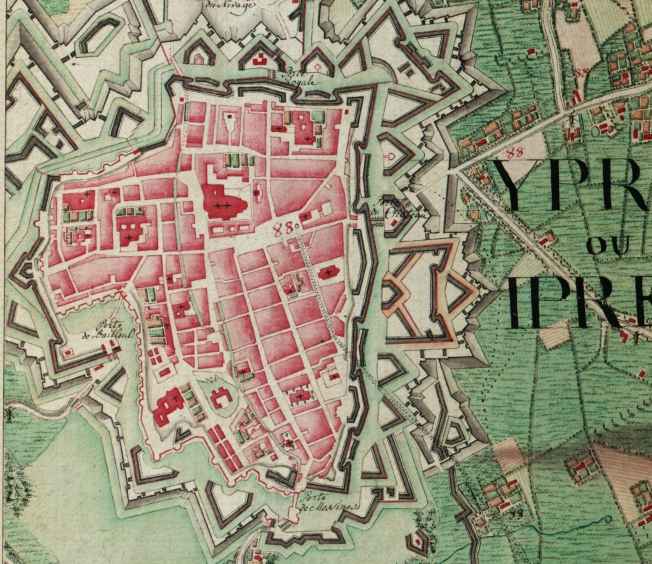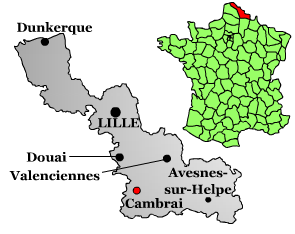|
Siege Of Dunkirk (1658)
The siege of Dunkirk in 1658 was a military operation by the allied forces of France and Commonwealth England intended to take the fortified port city of Dunkirk, Spain's greatest privateer base, from the Spanish and their confederates: the English royalists and French Fronduers. Dunkirk (Dutch for 'Church in the dunes') was a strategic port on the southern coast of the English Channel in the Spanish Netherlands that had often been a point of contention previously and had changed hands a number of times. Privateers operating out of Dunkirk and other ports had cost England some 1,500 to 2,000 merchant ships in the past year. The French and their English Commonwealth allies were commanded by Marshal of France Turenne. The siege would last a month and featured numerous sorties by the garrison and a determined relief attempt by the Spanish army under the command of Don Juan of Austria and his confederate English royalists under Duke of York and rebels of the French Fronde under ... [...More Info...] [...Related Items...] OR: [Wikipedia] [Google] [Baidu] |
James II Of England
James VII and II (14 October 1633 16 September 1701) was King of England and King of Ireland as James II, and King of Scotland as James VII from the death of his elder brother, Charles II, on 6 February 1685. He was deposed in the Glorious Revolution of 1688. He was the last Catholic monarch of England, Scotland, and Ireland. His reign is now remembered primarily for conflicts over religious tolerance, but it also involved struggles over the principles of absolutism and the divine right of kings. His deposition ended a century of political and civil strife in England by confirming the primacy of the English Parliament over the Crown. James succeeded to the thrones of England, Ireland, and Scotland following the death of his brother with widespread support in all three countries, largely because the principles of eligibility based on divine right and birth were widely accepted. Tolerance of his personal Catholicism did not extend to tolerance of Catholicism in general, and ... [...More Info...] [...Related Items...] OR: [Wikipedia] [Google] [Baidu] |
Calais
Calais ( , , traditionally , ) is a port city in the Pas-de-Calais department, of which it is a subprefecture. Although Calais is by far the largest city in Pas-de-Calais, the department's prefecture is its third-largest city of Arras. The population of the city proper is 72,929; that of the urban area is 149,673 (2018).Comparateur de territoire: Aire d'attraction des villes 2020 de Calais (073), Commune de Calais (62193) INSEE Calais overlooks the , the narrowest point in the English ... [...More Info...] [...Related Items...] OR: [Wikipedia] [Google] [Baidu] |
Boom (navigational Barrier)
A boom or a chain (also boom defence, harbour chain, river chain, chain boom, boom chain or variants) is an obstacle strung across a navigable stretch of water to control or block navigation. In modern times they usually have civil uses, such as to prevent access to a dangerous river channel. But, especially historically, they have been used militarily, with the goal of denying access to an enemy's ships: a modern example is the anti-submarine net. Booms have also been used to force passing vessels to pay a toll. Description A boom generally floats on the surface, while a chain can be on the surface or below the water. A chain could be made to float with rafts, logs, ships or other wood, making the chain a boom as well. Historical uses Especially in medieval times, the end of a chain could be attached to a chain tower or boom tower. This allowed safe raising or lowering of the chain, as they were often heavily fortified. By raising or lowering a chain or boom, access could be ... [...More Info...] [...Related Items...] OR: [Wikipedia] [Google] [Baidu] |
Ypres
Ypres ( , ; nl, Ieper ; vls, Yper; german: Ypern ) is a Belgian city and municipality in the province of West Flanders. Though the Dutch name is the official one, the city's French name is most commonly used in English. The municipality comprises the city of Ypres/Ieper and the villages of Boezinge, Brielen, Dikkebus, Elverdinge, Hollebeke, Sint-Jan, Vlamertinge, Voormezele, Zillebeke, and Zuidschote. Together, they are home to about 34,900 inhabitants. During the First World War, Ypres (or "Wipers" as it was commonly known by the British troops) was the centre of the Battles of Ypres between German and Allied forces. History Origins before First World War Ypres is an ancient town, known to have been raided by the Romans in the first century BC. It is first mentioned by name in 1066 and is probably named after the river Ieperlee on the banks of which it was founded. During the Middle Ages, Ypres was a prosperous Flemish city with a population of 40,000 in 1 ... [...More Info...] [...Related Items...] OR: [Wikipedia] [Google] [Baidu] |
Contravallation
Investment is the military process of surrounding an enemy fort (or town) with armed forces to prevent entry or escape. It serves both to cut communications with the outside world and to prevent supplies and reinforcements from being introduced. A contravallation is a line of fortifications, built by the attackers around the besieged fortification facing towards an enemy fort to protect the besiegers from sorties by its defenders and to enhance the blockade. The contravallation can be used as a base to launch assaults against the besieged city or to construct further earthworks nearer to the city. A circumvallation may be constructed if the besieging army is threatened by a field army allied to an enemy fort. It is a second line of fortifications outside the contravallation that faces away from an enemy fort. The circumvallation protects the besiegers from attacks by allies of the city's defenders and enhances the blockade of an enemy fort by making it more difficult to smuggle ... [...More Info...] [...Related Items...] OR: [Wikipedia] [Google] [Baidu] |
Governor
A governor is an administrative leader and head of a polity or political region, ranking under the head of state and in some cases, such as governors-general, as the head of state's official representative. Depending on the type of political region or polity, a ''governor'' may be either appointed or elected, and the governor's powers can vary significantly, depending on the public laws in place locally. The adjective pertaining to a governor is gubernatorial, from the Latin root ''gubernare''. Ancient empires Pre-Roman empires Though the legal and administrative framework of provinces, each administrated by a governor, was created by the Romans, the term ''governor'' has been a convenient term for historians to describe similar systems in antiquity. Indeed, many regions of the pre-Roman antiquity were ultimately replaced by Roman 'standardized' provincial governments after their conquest by Rome. Plato used the metaphor of turning the Ship of State with a rudder; the Latin ... [...More Info...] [...Related Items...] OR: [Wikipedia] [Google] [Baidu] |
Cambrai
Cambrai (, ; pcd, Kimbré; nl, Kamerijk), formerly Cambray and historically in English Camerick or Camericke, is a city in the Nord department and in the Hauts-de-France region of France on the Scheldt river, which is known locally as the Escaut river. A sub-prefecture of the department, Cambrai is a town which had 32,501 inhabitants in 2018. It is in the heart of the urban unit of Cambrai with 46,772 inhabitants. Its functional area, a more extensive range, included 94,576 inhabitants in 2018.Comparateur de territoire: Aire d'attraction des villes 2020 de Cambrai (108), Unité urbaine 2020 de Cambrai (59403), Commune de Cambrai (59122) INSEE With |
Cassel, Nord
Cassel (; nl, Kassel) is a commune in the Nord départment in northern France. Built on a prominent hill overlooking French Flanders, the town has existed since Roman times. It was developed by the Romans into an important urban centre and was the focus of a network of roads, which are still in use today, that converge on the hill. After the fall of the Roman Empire, Cassel became an important fortified stronghold for the rulers of Flanders which was repeatedly fought over before finally being annexed to France in the 17th century. It was the headquarters of Marshal Ferdinand Foch during part of the First World War. In 1940, during the German invasion of France, Cassel was the scene of a fierce three-day battle between British forces (led in part by Major Ronald Cartland, MP) and German forces which resulted in much of the town being destroyed. The town, which was rebuilt following the war, is a popular destination for visitors to French Flanders. It is renowned for its extensiv ... [...More Info...] [...Related Items...] OR: [Wikipedia] [Google] [Baidu] |
Oliver Cromwell
Oliver Cromwell (25 April 15993 September 1658) was an English politician and military officer who is widely regarded as one of the most important statesmen in English history. He came to prominence during the 1639 to 1651 Wars of the Three Kingdoms, first as a senior commander in the Parliamentarian army and then as a politician. A leading advocate of the execution of Charles I in January 1649, which led to the establishment of the Republican Commonwealth of England, Scotland and Ireland, he ruled as Lord Protector from December 1653 until his death in September 1658. Cromwell nevertheless remains a deeply controversial figure in both Britain and Ireland, due to his use of the military to first acquire, then retain political power, and the brutality of his 1649 Irish campaign. Educated at Sidney Sussex College, Cambridge, Cromwell was elected MP for Huntingdon in 1628, but the first 40 years of his life were undistinguished and at one point he contemplated emigrati ... [...More Info...] [...Related Items...] OR: [Wikipedia] [Google] [Baidu] |





